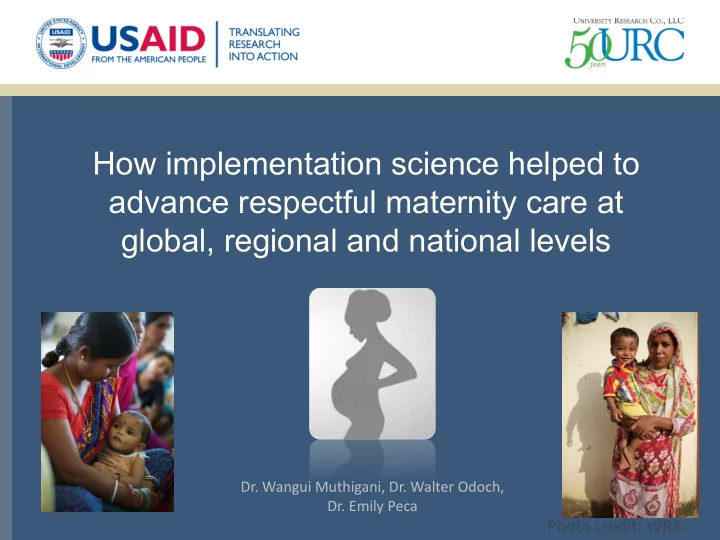

How implementation science helped to advance respectful maternity care at global, regional and national levels Dr. Wangui Muthigani, Dr. Walter Odoch, Dr. Emily Peca Photo credit: WRA
The Aim • Disrespect and abuse during childbirth was widely known, but not named; little evidence existed • Capture the breadth and scope of disrespectful and abusive maternity care • Link mistreatment, poor quality of care, and human rights abuses and care-seeking • Intentionally launch advocacy and evidence generation efforts in parallel
(Re-)framing the Problem This was key to informing subsequent research & advocacy efforts
Growing the Evidence • Heshima Project led by Pop Council, NNAK and FIDA in Kenya • Staha Project led by AMDD/Columbia and IHI in Tanzania Implementation New evidence Design Quantify & science on Approaches to Describe D&A evidence measurement & Address D&A generation implementation
Global Action 5
Translating RMC Implementation Science to Policy and Programs in Kenya Dr. Wangui Muthigani Maternal & Newborn Health Ministry of Health, Kenya
Objectives of the Maternal Newborn Health (MNH) Plan 2016-2018 1. Strengthen MNH Policy Environment & Research 2. Increase demand for MNH 3. Increase access to Maternal & New born Health 4. Strengthen provision of quality MNH services 5. Strengthen availability of commodities, supplies and equipment 6. Strengthen monitoring and evaluation
MoH Involvement in Heshima • Project launch presided by Director of Medical services and meeting brought together key stakeholders: – Health rights and gender advocates, policy makers, professional & regulatory bodies, health managers & workers, development partners • MOH led Steering Committee : – Technical oversight on implementation – Generating & validating ideas on definition of D&A RMC Approach: – Domesticating RMC terms in Kenyan context Maternity Open Day
Research Implementation • MOH involved in: – Research tools development, – Training of data collectors, – Supervision & analysis and data interpretation • Baseline results dissemination with stakeholders • Development of the interventions based on findings & stakeholder involvement • Implementation and refining based on lesson learnt Heshima Implementation Research • Periodic sharing of research progress with Project steering committee and MNH Technical Working group
Implications of the Heshima Implementation Science Project • Focus on community engagement and institutional visibility including information and counseling for adolescents/youth • Focus on improving customer care skills • Use of ‘Caring for the Carers’ approach • Scale up Nationwide with implementation starting in about 13 out of the 47 counties and continuing • More partners now working on RMC e.g. USAID, DFID, UNICEF, WHO, World Vision, MCSP/JHPIEGO
Moving Evidence to Policy: leveraging a regional institution to advance RMC Dr. Walter D Odoch East Central and Southern Africa Health Community Secretariat
ECSA Health Community • Inter-governmental organisation with the mission to promote and encourage efficiency and relevance in the provision of health services in the region. • A permanent mechanism to foster and strengthen regional cooperation and capacity to address the health needs of member states -1974 • Nine Member States: Kenya, Lesotho, Malawi, Mauritius, Seychelles, Swaziland, Uganda, Tanzania, Zambia, Zimbabwe • ECSA-HC has convening power, fosters stakeholder engagement and can influence policies/programs among member states and beyond
ECSA Consultation: Sharing Evidence to Move Policy for RMC • Opportunity : include RMC as part of an MNH consultation to highlight evidence, progress in East Africa, and determine how to move the issue forward • Who : 30+ delegates largely from Ministries (Tanzania, Malawi, Kenya, Zimbabwe, Malawi, Swaziland, Zambia, Mozambique, Uganda); researchers, development partners (USAID-DC& Delegates engaging in the values TZ, URC), regional body delegates clarification & attitudes transformation exercise (EAC, WHO Regional)
ECSA Consultation: Sharing Evidence to Move Policy for RMC • Consultation Content : • Presentation of evidence from the region • Values Clarification and Attitudes Transformation exercise • Comments from MoH delegates from Kenya (e.g. Dr. Muthigani) and Tanzania; EAC, and WHO regional office delegate • Next steps : • ECSA to continue to provide awareness raising opportunities/discussion around RMC at next BPF/DJCC • Work with SADC, EAC, Regional WHO office and ECSA to include RMC in future agendas • Collaborate on a possible event at the WHA
In Conclusion What we learned is that a successful • implementation science effort is not linear; And requires much more than • “evidence generators” at the helm. To move evidence into action, strategic • engagement of advocates, policy- makers, implementers and researchers is needed throughout the process. Photo credit: WRA 15
Recommend
More recommend